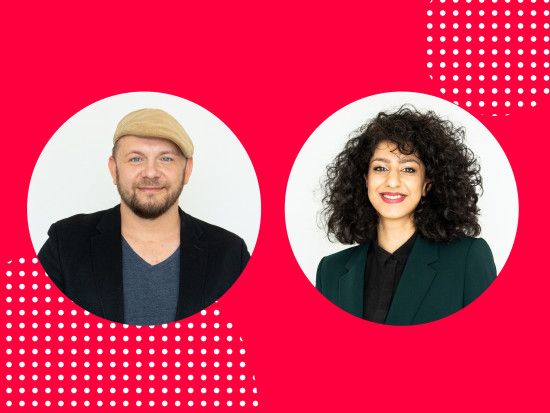Doesn't sound so far away - does it?

Learn more about trends, tendencies and developments in social media marketing and content marketing: Download the Digital Marketing Monitor 2020 now.
The Digital Marketing Monitor 2020 predicts a trend reversal in social media
Information overload in real time and individual customer needs - the networking of touchpoints within the digital customer journey is becoming more and more specialized and thus potentially more complex. This is particularly evident in social media, e.g. with their countless possibilities based on algorithms & Co.
Our Digital Marketing Monitor shows that it is precisely these multilayered, interlinked variables that present communication and social media experts with ever-growing challenges.
Our digital communications expert and lead consultant for social media, Ronny Barthold-Hilpert, talks in an interview with Kanika Kundra, Consultant Research & Insights and author of the Digital Marketing Monitor 2020, about the potential and challenges in his everyday work at Merkle and ventures a look into the future of social media.
Ronny: I find the self-assessment of the companies interesting, because it does not necessarily correspond with our experience. Our experience in day-to-day cooperation shows that the DACH companies are also doing well in the field of digitization - just not in the holistic sense, as an Amazon or Google might claim, but rather in smaller areas. These include, for example, the segments of marketing automation or personalization, in which these companies can certainly be regarded as pioneers. I personally feel that this is actually a healthier attitude than chasing after the rather generic - and perhaps ambivalent - label "Digital Leader".
In this context, I can hardly detect any lagging behind, but rather a specialization in different and in each case company-relevant digital focus topics, which we as an agency can then bring together well through our networks and develop further together with our clients. In this way - at least in theory - everyone can benefit from the experience of all.
Ronny: Our goal in digital communication is to place the company message - or the respective product - as efficiently as possible with the right target groups. The main aim here is to avoid wastage or reduce it to a minimum as far as possible. This requires - also in the social media sector - a certain amount of real-time communication or ad hoc dialogue with the target group and a certain feel for relevant trends. Often this is contrary to corporate guidelines and processes, under which quick reactions to daily events and target group needs are difficult to realize. Because until all those involved in the process have agreed, the social media topic or the current trend will be the same.
In my opinion, a change should take place here - not only on the part of the companies, but also on the part of the agencies. Of course, it is certainly not so trivial to manage, both organizationally and legally - but nevertheless: If it is to be about the best results - and I would simply like to have a wish now - then companies and agencies in the field of digital communication would have to move much closer together and theoretically (organizationally and legally) become one company or department. Then, in my opinion, we would perhaps even experience a kind of quantum leap in digital communication.
Ronny: By now, many companies have a pretty concrete idea of what they want to achieve with their activities in social media. For example, benchmarking is very popular, but so is awareness of their own products and topics among the relevant target group. In addition, the topics of sales and retargeting are increasingly coming up - at least when we focus on the international market.
In addition, in holistic communication scenarios for "hard facts" such as sales, the "soft topics" such as employer branding, employer culture and leadership are also becoming increasingly present on company profiles. In the meantime, many companies are taking the path of enabling their employees professionally and organizationally, for example, to act as corporate influencers for their company. And that is another step on the road to digitization.
One nice development - which I personally like best from a professional point of view - is that social media is now being integrated to its full potential into the overarching communications mix, for example in the context of data-based customer journeys. In other words, there is no longer an explicit social media goal that stands on its own - but a holistic communication goal that social media can effectively contribute to. A few years ago this looked completely different...
Ronny: Whether a budget - regardless of its monetary value - is sufficient for digital success depends, among other things, on how success is defined quantitatively and qualitatively, or how it is interpreted and measured by the customer. Usually we find out together with our customers in a kick-off workshop or in short interviews and develop the right measures to achieve their concrete goals effectively but also efficiently.
Often it is then important to assess the potential impact of a budget. We do this by calculating a potential ROI (editor's note: return on investment) based on special formulas and our experience with the relevant communication methods and recommending it to the client as a reference and benchmark for his measures and the budgets planned for them.
In addition to the conception, production and publication of special measures, especially in social media, the ROI then also takes into account media spending, for example, with which the relevant target groups can be optimally retargeted.
Ronny: In 2020 we will have to deal with the ever-increasing - or more aggressive - competition for the respective target group in digital communication. In social media, we can certainly counter this with increasingly specific content in a variety of formats in combination with media spending and outstanding targeting.
Companies that treat social media as a part of the overall picture and use data-based marketing automation in their communication wherever possible are likely to be particularly well positioned. This is where I see the greatest potential - or the most important trend, if you want to use the term in this way - in terms of effective and efficient holistic communication.
Ronny: Very good question. A vision of "in ten years" is and will remain a glimpse into the famous glass ball due to the incredibly fast progress. If we take a brief look at what is currently happening in social media, for example, in terms of artificial intelligence, then we quickly come to the subject of chat bots, personalized algorithms and extremely segmented retargeting measures.
For many companies, these topics may still be in their infancy, but in my opinion, increasing offers, transparent educational work and, above all, a generational change on the company and user side could well determine the coming decade. The consequence could be that, for example, First Level Service Contact will climb the digital development ladder much faster.
To illustrate this on a very practical scene: A user who follows a certain brand on Facebook receives a personalized offer as soon as he or she is close to the offline location. At the same time, he can use his social pay account to make cashless payments and evaluate and share his experiences in real time. The digital footprint left behind then helps marketers to continuously tailor their communication more precisely and use budgets more efficiently - and to inspire the user for further interactions.
Learn more about trends, tendencies and developments in social media marketing and content marketing: Download the Digital Marketing Monitor 2020 now.
